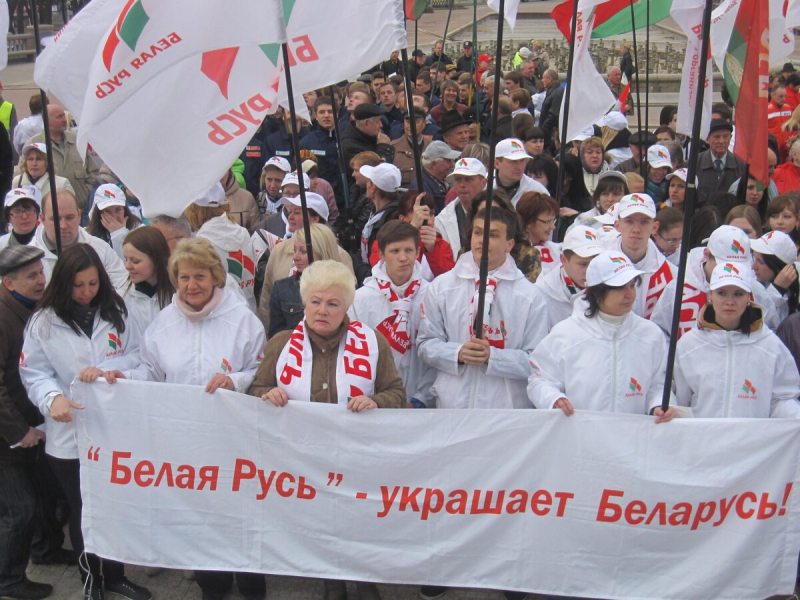"A tool for control, propaganda, and imitation of civic life." Belaya Rus as an example of an artificial political party
Elections were held and according to their results, it is known that members of the pro-government Belaya Rus party played a significant role in their imitation. In general, as human rights activists note, during the elections* 2024, a sharp increase in party representation was noted with the help of Belaya Rus. At the same time, as of the end of March 2024, according to the monitoring of Lawtrend, 1,600 non-profit organizations have been dissolved or are in the process of dissolution. Only four parties remained from the 16 which existed in Belarus, and all four are pro-government.
As noted in the first report of the Human Rights Defenders for Free Elections expert mission, the level of repression and human rights violations does not allow the possibility of holding democratic, free, and real elections. One of the reasons is the lack of independent public associations and political parties that could participate in the elections. Together with the legal service of Viasna, we talk about the Belaya Rus party, its role in the elections, and its significance for the regime.

- Illustrative photo
Is Belaya Rus a public association or a political party?Both. Belaya Rus has existed as a public association since 2007. It identifies itself as aimed at supporting Lukashenka's policies. This public association cannot be called a purely non-governmental organization. "This is a quasi-non-governmental organizations, which combines elements of a public organization and a state body, and such organizations are common not only in Belarus, but also in Western democratic countries. For example, in Britain they perform the functions of non-departmental government bodies, non-ministerial government departments, and executive agencies. At the same time, in Belarus, the public association Belaya Rus performs ideological functions in the absence of diversity of political views (pluralism)," notes Vika Rudziankova, the lawyer of Viasna. The Belaya Rus political party was registered on the basis of this public association on the eve of the election campaign, in May 2023. |
What is the role of public association and political party Belaya Rus in the elections*?First of all, as human rights activists noted, an overwhelming amount of the candidates for deputies were representatives of the Belaya Rus party. 42.3% of the candidates for the House of Representatives and 27.6% of the candidates for local Councils of Deputies were members of Belaya Rus. At the same time, during the Human Rights Defenders for Free Elections campaign, a significant number of districts were noted where candidates competed with each other, although they all belonged to the same party: Belaya Rus. In the Hrodna, Homieĺ, and Viciebsk local Councils of deputies, representatives of Belaya Rus received about half of the seats. Members of Belaya Rus also played a significant role in organizing the elections by participating in commissions at polling stations, which also counted votes. But in this case, they were members of the Belaya Rus public association along with the Belarusian Republican Youth Union (BRSM), Belarusian Women's Union, the Union of Veterans, and the Peace Foundation. Learn more about the results of the expert election* 2024 observation mission:
|
Why is this party artificial? How should it be?This is an artificial party, as it was created for special purposes: at least, for participation in elections*. The European Court of Human Rights recognizes political parties as valid subjects of the democratic process if they are voluntary associations, that is, no one is forced to participate in them, which have a task to participate in the management of public affairs, including by nominating candidates for free and democratic elections (Paragraph 56 of the Guidelines on Freedom of Association). "Voluntary" means that no one can be forced to join the party against their will. And it also means that a member of the party can leave it at any time without a fine or other sanctions imposed (Paragraph 115 of the Guidelines for the Legal Regulation of Political Parties). In Belarus, after the crackdowns that began in 2020, the regime destroyed all democratic institutions and continues to attack civil and political rights. In such circumstances, pro-government organizations and parties cannot be transparent structures, as required by international standards for political parties. Internal party life should be protected from state interference and should be regulated exclusively by the charter, which was developed by the participants of the party (Paragraph 62 of the Guidelines for the Legal Regulation of Political Parties). "Political parties should play a fundamental role in ensuring pluralism and democracy, but pro-government parties in Belarus, in the absence of independent parties, are used by the authorities as a supplier of spoilers and for demonstrating activity in elections," Viasna lawyer Vika Rudziankova notes. |
Why do the authorities create such parties?Viasna lawyer Vika Rudziankova explains why the regime needs artificial political parties: "Such parties are very convenient for the authorities: under the guise of a non-governmental organization or a political party, they are instruments of political control, propaganda, and imitation of civic life and popular support. In fact, it is still the government, but under the guise of a structure independent of it. Such parties require an ecosystem created specially for them, where they will perform an administrative role defined for them and have nothing to do with the democratic system, where they are not viable. Another typical feature of a political party is being open to criticism. At the same time, in the Belarusian independent media and society as a whole, people think only one thing about Belaya Rus, as well as about BRSM: "another pro-government organization." But what can be said about Belaya Rus, concerning its ideology? One is allowed to say only good things. The rest will lead to criminal liability. Unfortunately, we have enough defamatory articles (insulting Lukashenka or criticizing state symbols), as well as those who have already been imprisoned under these articles." |


















